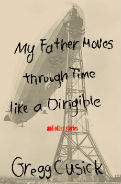
 |
Loneliness. Self-loathing. Guilt. Unexpected joy. All of these are common, human emotions, and they are also what pepper the lives of the characters Cusick chooses to tell us about. Most are negative, destructive, and color the people that move through his short stories in ever-darkening shades. Some, though, pull his players out from under their personal rainclouds to find a faint hope and a chance for a brighter day. Yet all of them we can relate to on some level, whether we have ever experienced them to the same degree or not, and perhaps that is part of what makes this collection so powerful.
In the title story, for example, we meet an old man trying unsuccessfully to get his point across to a phenomenally patient, if a bit patronizing, middle school principal. He is desperate to get the man, who is coincidentally around the age of his own son and whom he has approached with his proposal before, to understand the value of a play he wants the school to produce about the USS Shenandoah, an airship that crashed in 1925 when he was four. Unfortunately, his argument is hampered not only by repetition, excess explanation, and murky symbolism but also by emotionally clouded memories. He has somehow assumed the guilt for the loss of the dirigible and for his rigid father's abandonment of his family shortly after the disaster, an event that possibly contributed to his leaving his own wife and child years later.
We also encounter the narrator of "Mendacity," a man who agonizes over the secret drinking he does when he is supposedly out for one of his jogs. Like Willy Loman in Arthur Miller's Death of a Salesman, we see a husband too ashamed to come clean to a wife who probably already knows the truth anyway. And then there is Maggie, a daughter who can't stand to watch the self-hatred of her father continue to strip away the self-respect of her mother. Finally, when she sees him cause both the moral corruption and eventual death of a boy she has dated off and on, she flees as her brother Jackie had in "Gutted."
In contrast to the despair most of his characters are mired in, there are a few who manage to shake off their emotional shackles and change for the better. In "Welding Girl" an overweight young woman who has lived her life in the shadow of a successful older brother finds herself accidentally being signed up for welding instead of the technical writing class her mom wants her to take in a local tech school. She decides to see it through, partially as a way to hopefully express her poetic side and partially to get back, albeit secretly, at her parents. She gets much more than she expected, though, by discovering a new side to herself and dropping 30 pounds in the process.
Cusick's tales have an emotional and thematic depth that is reminiscent of the works of Tennessee Williams, and like the output of that literary giant, Cusick's s stories practically beg to be analyzed. Of the fourteen tales in the collection, at least three of them deal with the destruction of a boat or ship of some sort. Many have absent or emotionally abusive fathers. Thievery pops up frequently as do cabins in the woods, and two of the protagonists work as bartenders like the author. But it is possibly the author's skillful juggling of time that is the most obvious commonality in his work, a device often flubbed by weaker writers that Cusick executes flawlessly. Experts say that the short story is one of the hardest literary forms to write well. After reading this collection, there is little doubt that Cusick has mastered it.
RECOMMENDED by the US Review